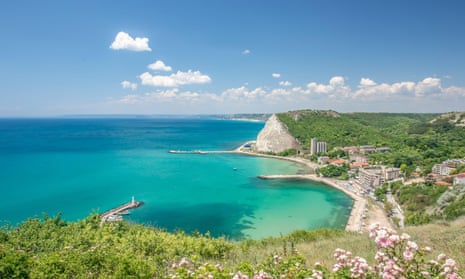London Underground strikes called off after talks breakthrough

Gwyn Topham
Planned London Underground strikes that threatened to bring the capital to a halt next week have been called off after talks.
The RMT and Aslef unions have now suspended industrial action that would have stopped the tube entirely for four days and caused widespread disruption from Monday to Saturday.
The strikes, by train drivers and station staff, were planned due to a dispute over changes to working conditions, including staffing reductions and a review of pensions brought as part of Transport for London’s post-Covid financial settlement with the government.
The RMT’s general secretary, Mick Lynch, said there had been “significant progress” in talks held by conciliation service Acas, but that it was not the end of the dispute, with negotiations continuing and a strike mandate still in place.
The union said that concessions included longer guarantees on earnings, no pension changes for at least three years and a halt to so-called productivity proposals that it said would have damaged the terms and conditions of RMT members.
The mayor of London, Sadiq Khan, said the suspension of strikes was “really welcome news for Londoners”, adding: “Despite the onerous funding deal conditions imposed by the government we have managed to avoid industrial action.
“Negotiation is always the best way forward and this shows what we can achieve by working with trade unions.”
Key events
Closing summary
Planned London Underground strikes that threatened to bring the capital to a halt next week have been called off after talks.
The RMT and Aslef unions have suspended industrial action that would have stopped the tube entirely for four days and caused widespread disruption from Monday to Saturday.
The strikes, by train drivers and station staff, were planned because of a dispute over changes to working conditions, including staffing reductions and a review of pensions brought as part of Transport for London’s post-Covid financial settlement with the government.
The RMT’s general secretary, Mick Lynch, said there had been “significant progress” in talks held by the conciliation service, Acas but that it was not the end of the dispute, with negotiations continuing and a strike mandate still in place.
Holidaymakers have begun taking to Britain’s roads, airports and ferry ports as the great summer getaway reaches its peak this weekend.
About 2 million people are expected to fly overseas from the UK between Friday and Monday, with about 13 million forecast to hit the roads in the coming days for trips abroad or a holiday at home.
Jammed roads are forecast, with a second rail strike on Saturday severely disrupting trains around the country, including cutting most of the main intercity services to one an hour.
Thank you for following us on the blog today. Have a great weekend. We’ll be back next week. Bye! – JK
Wall Street has opened higher.
The Nasdaq, which fell 2% yesterday, has bounced back nearly 90 points, or 0.6%, to 14,152 as technology stocks recovered. The Dow Jones has gained almost 70 points, or 0.2%, to 35,294 – its tenth day of gains – and the S&P 500 has climbed 16 points, or 0.36%, to 4,551.
Over here, the FTSE 100 edged 0.14% higher to 7,656, a 10 point gain. The Dax in Frankfurt is still down 0.27% at 16,161 while the CAC in Paris is 45 points, or 0.6%, ahead at 7,430 and the FTSE MiB in Milan has risen 70 points, or 0.2%, to 28,883.
The pound is flat against the dollar at $1.2856 and against the euro at €1.1550.
Simpler menus, less meat and closing for lunch: how UK restaurants are adapting to tough times
For pubs and restaurants hoping to save money and stay afloat in the face of a record squeeze on disposable incomes, there is now a new normal: younger staff, simpler menus, less meat and closing for lunch.
Since the onset of the pandemic the sector has been hit by skyrocketing energy costs, food inflation, high interest rates, a recruitment crisis and consumer uncertainty.
The latest insolvency data shows the impact of those pressures: restaurants closed at their highest rate in a decade in the first three months of this year, according to figures from the accountancy firm Price Bailey.
The latest data from Barclaycard payments shows nearly a fifth of owners and managers of hospitality businesses have considered permanently closing due to the impact of last-minute cancellations and no-shows.
So how are restaurant and bar owners adjusting?
Vivek Singh owns the Cinnamon Club, an Indian fine dining restaurant in the heart of Westminster that is popular with political types, along with three other mid-priced eateries dotted around central London.
To save money, Singh took the unusual step of removing one of the most popular dishes from the menu. Butter chicken is a rich, unctuous dish and a favourite with customers, but it contains tomatoes, which have steeply risen in price and are subject to shortages that have been blamed on bad weather in southern Europe and north Africa.
The dish was nixed for a jungle curry chicken that did not contain tomatoes, which has been “immensely popular” with customers, says Singh. As a small business manager, Singh can adapt quickly to changes in price and availability of ingredients.
Adrian Forte, owner of The Duck, a bar and restaurant in Bournemouth, describes the current circumstances in which his venue has to operate as unprecedented.
“I’ve been in the business for 40 years, and I’ve never seen such a perfect storm,” he says. “First Brexit, causing all these staff shortages, then Covid, and now the cost of living crisis. We feel like we are being squeezed on all sides.”
Up and down the country, restaurants, pubs and hotels have been driven to the brink: more than a third of UK hospitality businesses said in October last year they could go bust within months amid surging energy bills and declining bookings.
McDonald’s sets up investigations unit after UK staff claims of harassment
Joe Middleton
The boss of McDonald’s in the UK has set up an investigations unit after more than 100 current and former restaurant staff alleged sexual harassment and bullying at some outlets.
Alistair Macrow, the chief executive of McDonald’s for the UK and Ireland, said the claims were “personally and professionally shocking” and the business had “fallen short in some critical areas”.
A BBC investigation published on Tuesday found teenage workers were sexually assaulted or mistreated at certain fast-food outlets. There were further allegations of racism and homophobia.
In response, Macrow said the unit would refer the most serious cases to a third-party legal team staffed with “specialist investigators”.
Rice prices set to rise further after India bans non-basmati white rice exports

Kalyeena Makortoff
Rice prices are set to climb further, after India introduced an immediate ban on non-basmati white rice exports to curb domestic inflation. Heavy rains hit domestic crops, raising fears of further increases in global food prices.
The ban follows the failure of a 20% duty on international exports introduced in September to curb foreign demand, which has soared after extreme climate conditions hit production in countries and demand rose on the back of grain supply disruptions caused by Russia’s invasion of Ukraine.
India is the world’s largest rice exporter, accounting for more than 40% of global shipments. While the ban does not apply to higher-grade basmati rice – India’s best-known variety – non-basmati white rice accounts for about 25% of exports.
Rice markets have risen on the news. Vietnam’s 5% broken rice was offered at $515-$25 per metric ton, its highest since 2011, before the announcement late last night. It is now at $520.
India’s 5% broken parboiled variety hovered this week near a five-year peak of $421-428 per metric ton, and is now at $424.50. Thailand’s 5% broken rice jumped to $545 per ton, the highest since February 2021.


Gwyn Topham
Here’s our full story on the great summer getaway:
Holidaymakers have begun taking to Britain’s roads, airports and ferry ports as the great summer getaway reaches its peak this weekend.
About 2 million people are expected to fly overseas from the UK between Friday and Monday, with about 13 million forecast to hit the roads in the coming days for trips abroad or a holiday at home.
Jammed roads are forecast, with a second rail strike on Saturday severely disrupting trains around the country, including cutting most of the main intercity services to one an hour.
Airline bosses have said the prospect of flying into a heatwave has not affected bookings despite holidaymakers voicing concerns, with hundreds of thousands heading to the baking beaches and cities of southern Europe, with damper, cooler weather lingering over Britain.
UK government borrowing falls in June but pre-election tax cuts unlikely
The UK’s spending deficit fell unexpectedly last month, helped by higher income tax revenues on the back of a flurry of wage rises earlier in the year and a jump in VAT receipts.
The public finances were £18.5bn in the red in June, £400m below the same month last year and below the £22bn shortfall the City had forecast, the Office for National Statistics said.
A reduction in emergency spending on measures to support households and businesses during the cost of living crisis also helped bring down the deficit.
However, across-the-board increases in welfare payments and pensions and the third-highest ever monthly debt interest payment of £12.5bn cut Jeremy Hunt’s wriggle room for his autumn statement this year. Analysts suggested any tax cut before next year’s general election looked unlikely.
London Underground strikes called off after talks breakthrough

Gwyn Topham
Planned London Underground strikes that threatened to bring the capital to a halt next week have been called off after talks.
The RMT and Aslef unions have now suspended industrial action that would have stopped the tube entirely for four days and caused widespread disruption from Monday to Saturday.
The strikes, by train drivers and station staff, were planned due to a dispute over changes to working conditions, including staffing reductions and a review of pensions brought as part of Transport for London’s post-Covid financial settlement with the government.
The RMT’s general secretary, Mick Lynch, said there had been “significant progress” in talks held by conciliation service Acas, but that it was not the end of the dispute, with negotiations continuing and a strike mandate still in place.
The union said that concessions included longer guarantees on earnings, no pension changes for at least three years and a halt to so-called productivity proposals that it said would have damaged the terms and conditions of RMT members.
The mayor of London, Sadiq Khan, said the suspension of strikes was “really welcome news for Londoners”, adding: “Despite the onerous funding deal conditions imposed by the government we have managed to avoid industrial action.
“Negotiation is always the best way forward and this shows what we can achieve by working with trade unions.”
Ovo Energy taps investors for £200m after plunging to £1.3bn loss
Jillian Ambrose
The long-standing investors behind Ovo Energy, the UK’s third-largest energy supplier, have increased their stake in the company to £200m after the energy supplier plunged to a £1.3bn loss last year.
Ovo’s chief executive, Raman Bhatia, said Mayfair Equity Partners and Morgan Stanley Investment Management, which have both backed Ovo since it was founded in 2015, agreed to up their stake by an undisclosed amount despite energy market’s challenges.
Bhatia said the investment underlines Ovo’s “potential for growth”. But the Guardian understands that no new cash will come into the business as a result of the deal. Instead, the long-term backers have agreed to increase their stake while other investors reduce their share. Ovo has only two other investors: Mitsubishi Corporation, and the company’s founder Stephen Fitzpatrick.
The energy crisis caused the company to swing to a £1.3bn pre-tax loss for 2022 from a £335m profit in 2021. The energy company, which has around 4.5 million customers, blamed the loss on being “well hedged”. Ovo buys gas and electricity from the wholesale market ahead of when its customers will need it. But the recent plunge in market prices from last year’s record highs means the value of its portfolio has fallen too.
The company said:
For accounting purposes this results in a large loss in 2022 but this has no cash impact and will reverse in future periods when customers use this energy.

In financial markets, global stocks are subdued after disappointing earnings from big US tech companies sapped risk appetite.
Shares in the electric carmaker Tesla and streaming giant Netflix slumped 9.7% and 8.4% respectively yesterday while Taiwanese chipmaker TSMC warned of a drop in 2023 sales this week. This drove the tech-heavy Nasdaq 2% lower, its biggest one-day loss since March.
The FTSE 100 index in London is less than 8 points ahead at 7,653, while Germany’s Dax is down 64 points, or 0.4%, and the French and Italian bourses are between 0.2% and 0.3% ahead.
🛍️ British retail sales beat market expectations this morning:
+0.7% m/m in June vs +0.2% forecast
-1.0% y/y vs -1.5% forecastHard as usual to disentangle one-off effects (hot weather, coronation distortion in May) from any trend.https://t.co/azvjjI6WWP
— David Milliken (@david_milliken) July 21, 2023
Britain’s competition watchdog is waiting for Microsoft to submit a modified deal structure to buy “Call of Duty” maker Activision Blizzard for $69bn (£53bn).
The Competition and Markets Authority’s chief executive, Sarah Cardell, has been talking about this on BBC radio 4 this morning.
The European and US regulators have already approved the deal, but the CMA won’t give the green light until its concerns around cloud gaming are fully reserved, Cardell stressed.
We identified very serious concerns about cloud gaming and the impact that that deal would have on the market and those concerns would need to be fully resolved by any new transaction structure.
It’s incredibly important… that this market remains open and competitive. It’s a new developing innovative market. And we want to make sure that all sorts of businesses can compete and thrive in that market. And that includes, for example, being able to offer cloud streaming through a variety of different business models, subscription services, for example, that includes being able to offer cloud gaming on non-Windows operating systems. So we will need to see what Microsoft puts forward in terms of its newly structured offer. But be in no doubt, as I say this would need to fully resolve our concerns.
She said the CMA’s concerns were shared by the other regulators.
We all shared very serious concerns about this transaction. There was no difference between us in that sense. We have to carry through our process in the UK and apply the UK rules that we have. If Microsoft puts forward a new h transaction and that triggers a new notification process, we will consider that regardless of what’s happening in other jurisdictions.
The European Commission accepted Microsoft’s proposed remedies and cleared the transaction. Then the Federal Trade Commission in the US, which wanted to fight the deal, was blocked in court last week from gaining an injunction to halt it.
Here’s our full story on retail sales:
The hottest June on record gave an unexpected boost to retail sales last month, with households in Great Britain buying more food and furniture despite continued pressure on budgets.
Officials figures showed that the quantity of goods bought rose 0.7% month on month, much higher than average analyst forecasts of a 0.2% bump in sales volumes, with most retailers reporting purchases were up, aside from petrol and diesel sellers.
That is a bounceback from the mere 0.1% monthly rise in retail sales in May, a figure that has been revised down from initial estimates of 0.3%.
Supermarkets were one of the biggest drivers of consumer spending, with food sales benefiting from discounts and rising temperatures. Food stores, which had experienced a 0.4% drop in May, bounced back with a 0.7% rise in sales in June, according to the Office for National Statistics (ONS).
Family getaways hit by traffic jams and delays at Dover
The big summer getaway has started, but it’s marred by traffic jams on Britain’s roads and delays at the Port of Dover.
An estimated 12.6m car journeys will be made for a day trip or holiday between Friday and Monday as most schools in England and Wales break up for the summer, according to the RAC, PA reported.
The Association of British Travel Agents said more than two million UK holidaymakers will be heading overseas this weekend.
Spain remains the top destination for families, in particular the Costa del Sol and the Balearic and Canary Islands, but there is also strong demand for Bulgaria, Portugal, Turkey, Morocco and Greece, the travel association said.
Mark Tanzer, Abta chief executive, said:
Thousands of families will be jetting off this weekend as the majority of schools in the UK start their summer break. Many of these will be taking their first overseas summer holiday since the pandemic, returning to much-loved destinations, and will have a fantastic experience in store.
The Port of Dover said it was taking about 90 minutes for departing passengers to pass through border checks this morning. It said it is “an extremely popular travel day” and “traffic is moving according to plan”. Enhanced post-Brexit passport checks by French border officials Police Aux Frontieres have significantly increased processing times at the Kent port.
Ferry operator DFDS said it is operating additional sailings to meet demand this weekend.
Rail passengers face more disruption from a second day of strikes tomorrow, as members of the Rail, Maritime and Transport union (RMT), including station staff and train managers, strike again in a long-running dispute over pay, jobs and conditions.
On the roads, National Highways said it has closed part of the Dartford Crossing because of a crash, causing three miles of congestion. This is where the M25, the UK’s busiest motorway, crosses the River Thames east of London between Dartford and Thurrock.
Transport analysis company Inrix said traffic hotspots will include the M5 south from near Bristol (junction 15) to Bridgwater (junction 23), which is a popular route for holidaymakers travelling to the south west. Another is the M25 clockwise between junction 10 for the A3 to Kingston and junction 6 for the A22 to East Grinstead.










